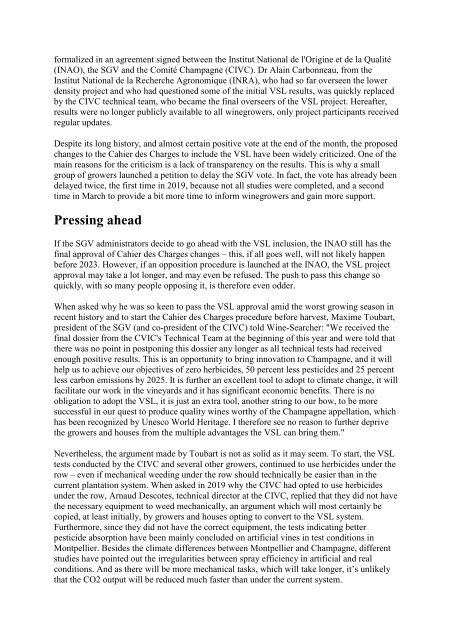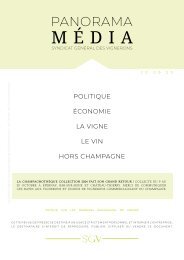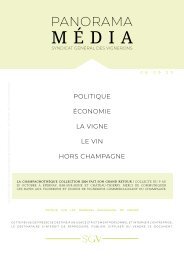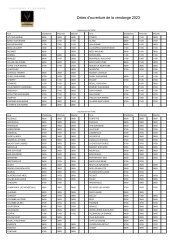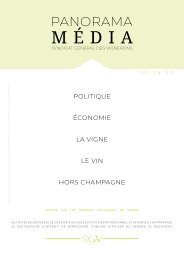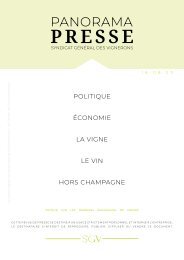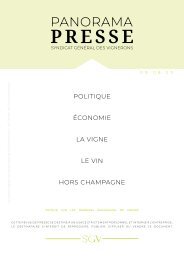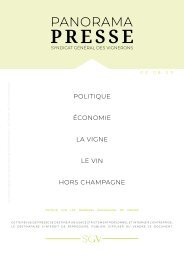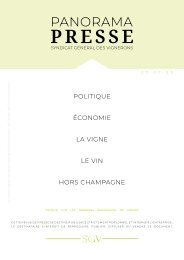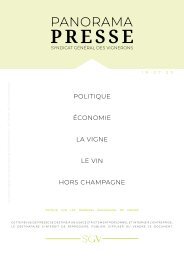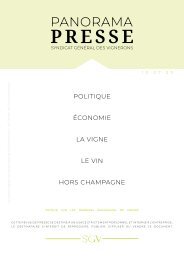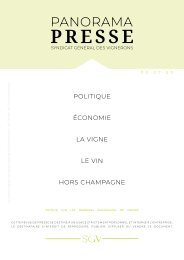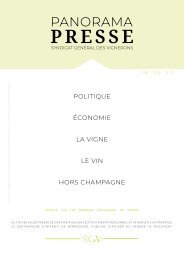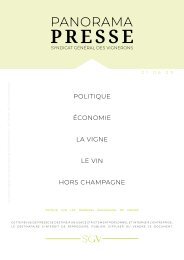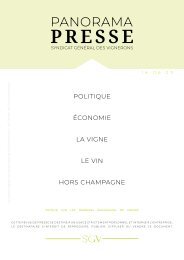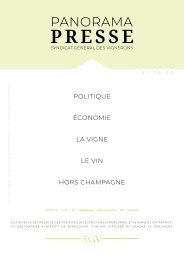You also want an ePaper? Increase the reach of your titles
YUMPU automatically turns print PDFs into web optimized ePapers that Google loves.
formalized in an agreement signed between the Institut National <strong>de</strong> l'Origine et <strong>de</strong> la Qualité<br />
(INAO), the SGV and the Comité Champagne (CIVC). Dr Alain Carbonneau, from the<br />
Institut National <strong>de</strong> la Recherche Agronomique (INRA), who had so far overseen the lower<br />
<strong>de</strong>nsity project and who had questioned some of the initial VSL results, was quickly replaced<br />
by the CIVC technical team, who became the final overseers of the VSL project. Hereafter,<br />
results were no longer publicly available to all winegrowers, only project participants received<br />
regular updates.<br />
Despite its long history, and almost certain positive vote at the end of the month, the proposed<br />
changes to the Cahier <strong>de</strong>s Charges to inclu<strong>de</strong> the VSL have been wi<strong>de</strong>ly criticized. One of the<br />
main reasons for the criticism is a lack of transparency on the results. This is why a small<br />
group of growers launched a petition to <strong>de</strong>lay the SGV vote. In fact, the vote has already been<br />
<strong>de</strong>layed twice, the first time in 2019, because not all studies were completed, and a second<br />
time in March to provi<strong>de</strong> a bit more time to inform winegrowers and gain more support.<br />
Pressing ahead<br />
If the SGV administrators <strong>de</strong>ci<strong>de</strong> to go ahead with the VSL inclusion, the INAO still has the<br />
final approval of Cahier <strong>de</strong>s Charges changes – this, if all goes well, will not likely happen<br />
before 2023. However, if an opposition proce<strong>du</strong>re is launched at the INAO, the VSL project<br />
approval may take a lot longer, and may even be refused. The push to pass this change so<br />
quickly, with so many people opposing it, is therefore even od<strong>de</strong>r.<br />
When asked why he was so keen to pass the VSL approval amid the worst growing season in<br />
recent history and to start the Cahier <strong>de</strong>s Charges proce<strong>du</strong>re before harvest, Maxime Toubart,<br />
presi<strong>de</strong>nt of the SGV (and co-presi<strong>de</strong>nt of the CIVC) told Wine-Searcher: "We received the<br />
final dossier from the CVIC's Technical Team at the beginning of this year and were told that<br />
there was no point in postponing this dossier any longer as all technical tests had received<br />
enough positive results. This is an opportunity to bring innovation to Champagne, and it will<br />
help us to achieve our objectives of zero herbici<strong>de</strong>s, 50 percent less pestici<strong>de</strong>s and 25 percent<br />
less carbon emissions by 2025. It is further an excellent tool to adopt to climate change, it will<br />
facilitate our work in the vineyards and it has significant economic benefits. There is no<br />
obligation to adopt the VSL, it is just an extra tool, another string to our bow, to be more<br />
successful in our quest to pro<strong>du</strong>ce quality wines worthy of the Champagne appellation, which<br />
has been recognized by Unesco World Heritage. I therefore see no reason to further <strong>de</strong>prive<br />
the growers and houses from the multiple advantages the VSL can bring them."<br />
Nevertheless, the argument ma<strong>de</strong> by Toubart is not as solid as it may seem. To start, the VSL<br />
tests con<strong>du</strong>cted by the CIVC and several other growers, continued to use herbici<strong>de</strong>s un<strong>de</strong>r the<br />
row – even if mechanical weeding un<strong>de</strong>r the row should technically be easier than in the<br />
current plantation system. When asked in 2019 why the CIVC had opted to use herbici<strong>de</strong>s<br />
un<strong>de</strong>r the row, Arnaud Descotes, technical director at the CIVC, replied that they did not have<br />
the necessary equipment to weed mechanically, an argument which will most certainly be<br />
copied, at least initially, by growers and houses opting to convert to the VSL system.<br />
Furthermore, since they did not have the correct equipment, the tests indicating better<br />
pestici<strong>de</strong> absorption have been mainly conclu<strong>de</strong>d on artificial vines in test conditions in<br />
Montpellier. Besi<strong>de</strong>s the climate differences between Montpellier and Champagne, different<br />
studies have pointed out the irregularities between spray efficiency in artificial and real<br />
conditions. And as there will be more mechanical tasks, which will take longer, it’s unlikely<br />
that the CO2 output will be re<strong>du</strong>ced much faster than un<strong>de</strong>r the current system.


